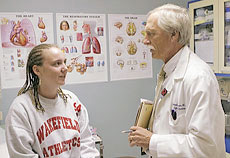Who We Are
The Center for Infectious Diseases and Prevention at Lahey Hospital & Medical Center provides comprehensive evaluation and treatment of patients with infectious diseases, both on an inpatient and outpatient basis. Our staff is committed to patient care and education. Our goal is to provide the highest level of clinical care, with an emphasis on preventing disease before it occurs through the appropriate use of antibiotics and vaccines.
Clinical Expertise
 Our team of Lahey physicians and nurses has broad expertise in the diagnosis and treatment of infectious diseases due to bacteria, viruses, fungi and parasites and works in concert with full-service laboratories specializing in microbiology, immunology, and parasitology. Our staff is also extensively trained in the identification and management of the agents of bioterrorism and the prevention and treatment of hospital-acquired infections. Additionally, members of the department specialize in treating infections related to immunosuppressive therapy and those with solid organ transplants.
Our team of Lahey physicians and nurses has broad expertise in the diagnosis and treatment of infectious diseases due to bacteria, viruses, fungi and parasites and works in concert with full-service laboratories specializing in microbiology, immunology, and parasitology. Our staff is also extensively trained in the identification and management of the agents of bioterrorism and the prevention and treatment of hospital-acquired infections. Additionally, members of the department specialize in treating infections related to immunosuppressive therapy and those with solid organ transplants.
Our Travel and Tropical Medicine Clinic provides vaccines and medications to prevent and treat common travel-related infections (e.g., malaria or traveler’s diarrhea) and more unusual diseases acquired abroad (e.g., Severe Acute Respiratory Syndrome (SARS), dengue fever, and leprosy).
Many of the patients we treat have illnesses such as bone and joint or soft tissue infections, urinary tract infections, meningitis and pneumonia. Our staff also has a strong clinical interest in patients with fever of unknown origin, pulmonary or extrapulmonary tuberculosis, hepatitis, AIDS/HIV, Lyme disease and other tick-borne infections.
Ongoing Research
We are currently involved in research studies evaluating antibiotic-resistant bacteria and new methods of prevention and management of infectious diseases in critical care units and for patients with post-operative infections.
An infectious disease (ID) specialist is a physician with advanced training in the diagnosis and treatment of illnesses caused by microorganisms or germs. Because their training and experience cover a unique cross-section of medicine, ID specialists often are asked to evaluate and oversee challenging cases. ID specialists practice both in hospitals and in office settings.
ID physicians undergo nine to ten years of education and training. After four years of medical school, he or she spent three more years being trained as a doctor of internal medicine. This is followed by two to three years of specialized training in infectious diseases. All Lahey Hospital & Medical Center ID specialists also are board certified, which means they have passed an examination by the American Board of Internal Medicine and are certified in both internal medicine and infectious diseases.
ID specialists diagnose and treat conditions resulting from all types of infections, including those caused by germs such as bacteria, viruses, fungi and parasites. These microscopic organisms penetrate the body’s natural barriers and multiply, creating symptoms ranging from sore throat and fever (as in the case of strep throat) to more serious and even deadly problems (such as AIDS or meningitis).
ID specialists also see patients to determine whether their symptoms are due infection. Most commonly, the patient has a fever.

